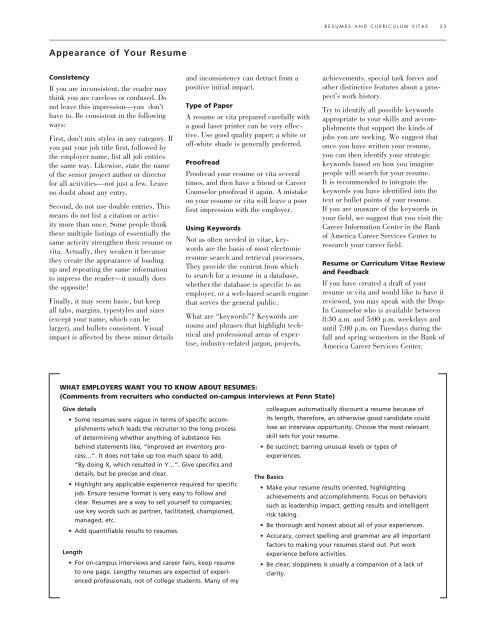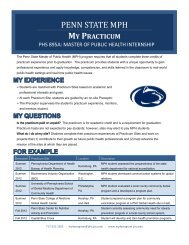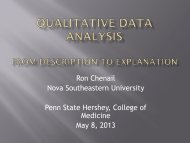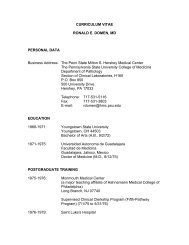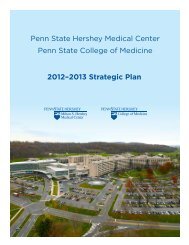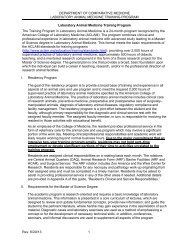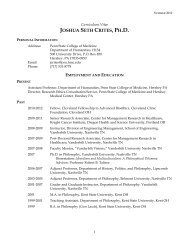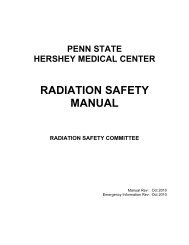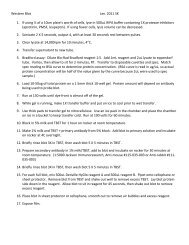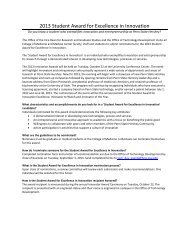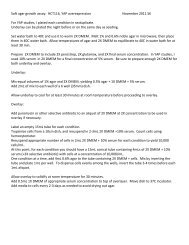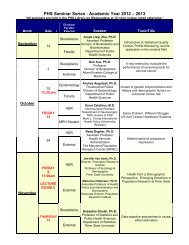Penn State Graduate Student Career Guide - Biomedical Sciences ...
Penn State Graduate Student Career Guide - Biomedical Sciences ...
Penn State Graduate Student Career Guide - Biomedical Sciences ...
You also want an ePaper? Increase the reach of your titles
YUMPU automatically turns print PDFs into web optimized ePapers that Google loves.
RESUMES AND CURRICULUM VITAE 33<br />
Appearance of Your Resume<br />
Consistency<br />
If you are inconsistent, the reader may<br />
think you are careless or confused. Do<br />
not leave this impression—you don’t<br />
have to. Be consistent in the following<br />
ways:<br />
First, don’t mix styles in any category. If<br />
you put your job title first, followed by<br />
the employer name, list all job entries<br />
the same way. Likewise, state the name<br />
of the senior project author or director<br />
for all activities—not just a few. Leave<br />
no doubt about any entry.<br />
Second, do not use double entries. This<br />
means do not list a citation or activity<br />
more than once. Some people think<br />
these multiple listings of essentially the<br />
same activity strengthen their resume or<br />
vita. Actually, they weaken it because<br />
they create the appearance of loading<br />
up and repeating the same information<br />
to impress the reader—it usually does<br />
the opposite!<br />
Finally, it may seem basic, but keep<br />
all tabs, margins, typestyles and sizes<br />
(except your name, which can be<br />
larger), and bullets consistent. Visual<br />
impact is affected by these minor details<br />
and inconsistency can detract from a<br />
positive initial impact.<br />
Type of Paper<br />
A resume or vita prepared carefully with<br />
a good laser printer can be very effective.<br />
Use good quality paper; a white or<br />
off-white shade is generally preferred.<br />
Proofread<br />
Proofread your resume or vita several<br />
times, and then have a friend or <strong>Career</strong><br />
Counselor proofread it again. A mistake<br />
on your resume or vita will leave a poor<br />
first impression with the employer.<br />
Using Keywords<br />
Not as often needed in vitae, keywords<br />
are the basis of most electronic<br />
resume search and retrieval processes.<br />
They provide the content from which<br />
to search for a resume in a database,<br />
whether the database is specific to an<br />
employer, or a web-based search engine<br />
that serves the general public.<br />
What are “keywords”? Keywords are<br />
nouns and phrases that highlight technical<br />
and professional areas of expertise,<br />
industry-related jargon, projects,<br />
achievements, special task forces and<br />
other distinctive features about a prospect’s<br />
work history.<br />
Try to identify all possible keywords<br />
appropriate to your skills and accomplishments<br />
that support the kinds of<br />
jobs you are seeking. We suggest that<br />
once you have written your resume,<br />
you can then identify your strategic<br />
keywords based on how you imagine<br />
people will search for your resume.<br />
It is recommended to integrate the<br />
keywords you have identified into the<br />
text or bullet points of your resume.<br />
If you are unaware of the keywords in<br />
your field, we suggest that you visit the<br />
<strong>Career</strong> Information Center in the Bank<br />
of America <strong>Career</strong> Services Center to<br />
research your career field.<br />
Resume or Curriculum Vitae Review<br />
and Feedback<br />
If you have created a draft of your<br />
resume or vita and would like to have it<br />
reviewed, you may speak with the Drop-<br />
In Counselor who is available between<br />
8:30 a.m. and 5:00 p.m. weekdays and<br />
until 7:00 p.m. on Tuesdays during the<br />
fall and spring semesters in the Bank of<br />
America <strong>Career</strong> Services Center.<br />
WHAT EMPLOYERS WANT YOU TO KNOW ABOUT RESUMES:<br />
(Comments from recruiters who conducted on-campus interviews at <strong>Penn</strong> <strong>State</strong>)<br />
Give details<br />
• Some resumes were vague in terms of specific accomplishments<br />
which leads the recruiter to the long process<br />
of determining whether anything of substance lies<br />
behind statements like, “Improved an inventory process…”.<br />
It does not take up too much space to add,<br />
“By doing X, which resulted in Y…”. Give specifics and<br />
details, but be precise and clear.<br />
• Highlight any applicable experience required for specific<br />
job. Ensure resume format is very easy to follow and<br />
clear. Resumes are a way to sell yourself to companies;<br />
use key words such as partner, facilitated, championed,<br />
managed, etc.<br />
• Add quantifiable results to resumes.<br />
Length<br />
• For on-campus interviews and career fairs, keep resume<br />
to one page. Lengthy resumes are expected of experienced<br />
professionals, not of college students. Many of my<br />
colleagues automatically discount a resume because of<br />
its length, therefore, an otherwise good candidate could<br />
lose an interview opportunity. Choose the most relevant<br />
skill sets for your resume.<br />
• Be succinct; barring unusual levels or types of<br />
experiences.<br />
The Basics<br />
• Make your resume results oriented, highlighting<br />
achievements and accomplishments. Focus on behaviors<br />
such as leadership impact, getting results and intelligent<br />
risk taking.<br />
• Be thorough and honest about all of your experiences.<br />
• Accuracy, correct spelling and grammar are all important<br />
factors to making your resumes stand out. Put work<br />
experience before activities.<br />
• Be clear; sloppiness is usually a companion of a lack of<br />
clarity.


